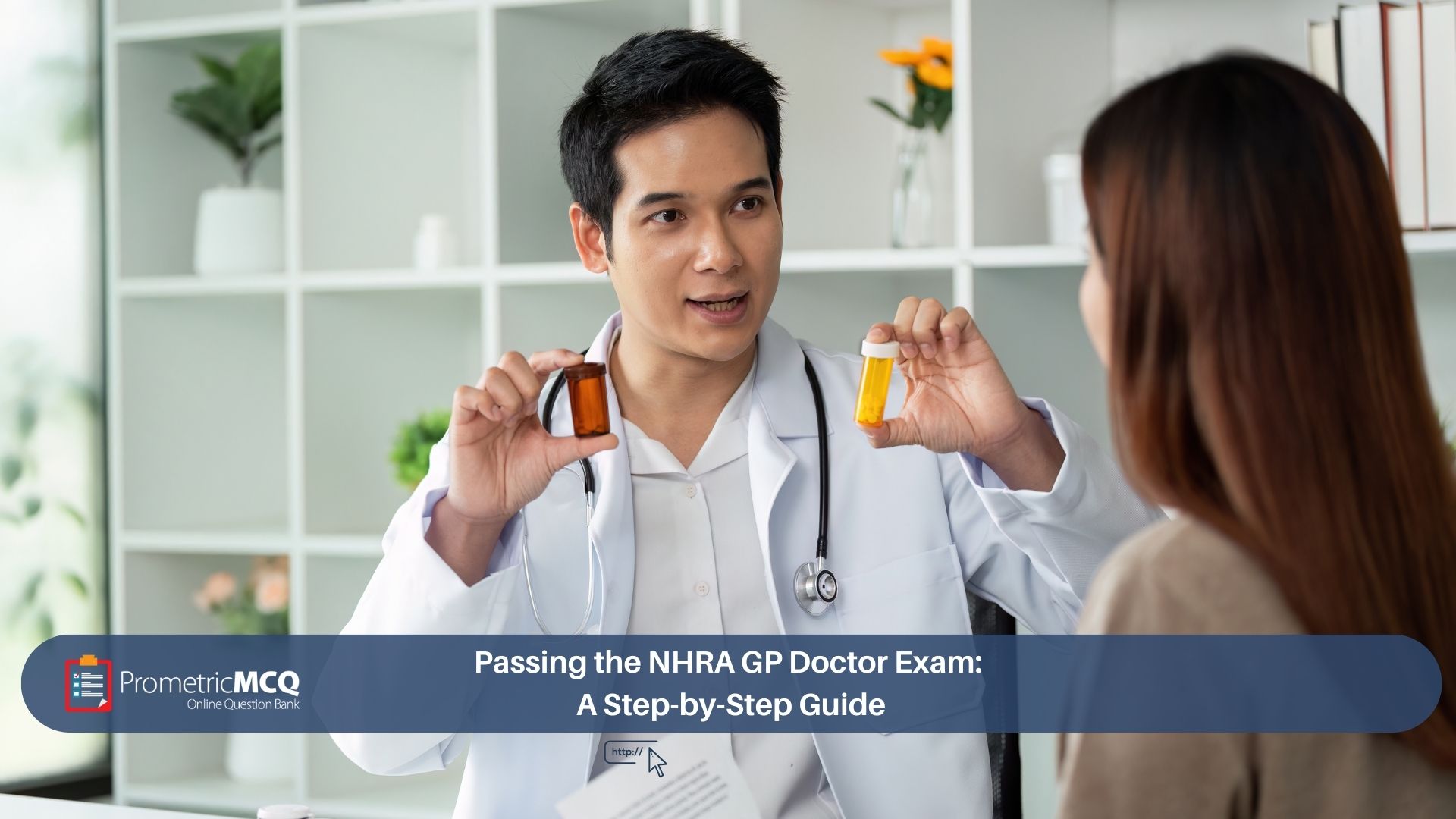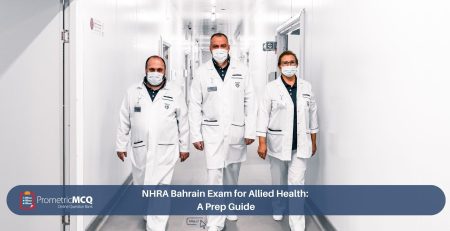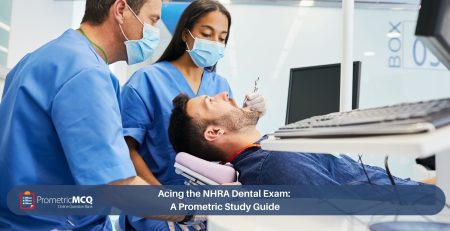
Passing the NHRA GP Doctor Exam: A Step-by-Step Guide
fatima@prometricmcq.com2025-09-18T18:30:07+00:00Table of Contents
TogglePassing the NHRA GP Doctor Exam: A Step-by-Step Guide
The Kingdom of Bahrain, with its rapidly advancing healthcare sector and strategic location in the Gulf, is an increasingly attractive destination for medical professionals worldwide. To ensure the highest standards of care, the National Health Regulatory Authority (NHRA) mandates that all physicians pass a rigorous licensing examination before they can practice. For General Practitioners, this is the NHRA GP Doctor Exam, a comprehensive assessment designed to validate a doctor’s clinical knowledge, diagnostic skills, and ability to manage a wide spectrum of medical conditions safely and effectively.
This exam is more than an academic exercise; it is a gateway to a promising career. However, the path to success involves two distinct but equally important challenges: navigating the meticulous administrative process of registration and mastering the vast clinical curriculum. The journey from application to licensure can be complex, involving credential verification, multiple online portals, and a deep understanding of the exam’s structure and content.
This ultimate 2025 guide is engineered to be your trusted companion through every stage of this process. We will provide a detailed, step-by-step walkthrough of the entire registration, DataFlow, and exam scheduling procedure. Furthermore, we will delve deep into the exam’s blueprint, break down high-yield clinical topics, and offer expert strategies to tackle the case-based MCQs. Complete with a comprehensive 10-point FAQ, this guide aims to eliminate confusion and empower you with a clear, actionable plan for your Bahrain NHRA exam preparation.
Key Takeaways for NHRA Exam Success
- It’s a Two-Part Challenge: Success requires mastering both the administrative registration process and the clinical exam content. Start the administrative steps early.
- Clinical Reasoning is King: The exam is built on clinical vignettes. Your ability to formulate a differential diagnosis and a management plan is the most critical skill.
- Master High-Yield Domains: A strong foundation in Internal Medicine, Pediatrics, OB/GYN, and Surgery is non-negotiable.
- DataFlow is Mandatory: Primary Source Verification (PSV) of your credentials by the DataFlow Group is a required step before you can get your eligibility to sit for the exam.
- Practice with Purpose: Consistent practice with a high-quality MCQ bank is the single most effective study method to pass the exam.
Phase 1: The Administrative Gauntlet – A Step-by-Step Registration Guide
Before you even think about opening a textbook, you must conquer the registration process. Follow these steps meticulously to avoid delays.
Step 1: Initial Application via the NHRA Portal
Your journey begins on the official NHRA website. The goal here is to get your qualifications initially assessed and be directed to the DataFlow verification process.
- Create an Account: Navigate to the official National Health Regulatory Authority (NHRA) website and create a new user account.
- Select the Service: Log in and choose the service for “Registration of a Physician” or “Professional Licensing.”
- Upload Initial Documents: You will be required to upload clear, scanned copies of your core documents. This typically includes your passport, medical degree (MBBS or equivalent), and your home country’s medical license.
- Submit for Initial Review: The NHRA team will conduct a preliminary review of your documents to ensure you meet the basic eligibility criteria for a General Practitioner in Bahrain.
Step 2: Completing the DataFlow (PSV) Process
Once the NHRA approves your initial application, you will be required to undergo Primary Source Verification (PSV) through the DataFlow Group. This is a mandatory background check on your credentials.
- Receive DataFlow Instructions: The NHRA will provide you with instructions or a link to initiate your DataFlow application specifically for the NHRA Bahrain.
- Submit Documents for Verification: You will upload a comprehensive set of documents to the DataFlow portal, including your medical degree(s), transcripts, internship certificate, experience letters, and license.
- Pay the Verification Fee: The PSV process requires a fee, which is paid directly to DataFlow online. The cost depends on the number of documents you need verified.
- The Waiting Period: DataFlow will then contact your university, previous employers, and medical council to verify each document. This is often the longest part of the process, taking anywhere from 4 to 8 weeks.
- Receive the Report: Upon completion, DataFlow will send a final report directly to the NHRA. A “Positive” report is required to move forward.
Pro Tip: Before starting the DataFlow process, proactively contact the HR departments of your previous hospitals and the registrar of your university. Inform them that they will receive a verification request from DataFlow and ask for their prompt cooperation. This can significantly speed up the process.
Step 3: Scheduling Your Exam with Prometric
Once the NHRA receives your positive DataFlow report, they will issue you an “Eligibility ID” or “Approval Letter.” This is your key to booking the exam.
- Receive Eligibility from NHRA: You will be notified via email or through the NHRA portal once you are deemed eligible to sit for the examination.
- Visit the Prometric Website: Go to the official Prometric website and select “National Health Regulatory Authority (NHRA) – Bahrain” as the test sponsor.
- Enter Your Eligibility ID: You will be prompted to enter the unique eligibility number provided by the NHRA.
- Choose Your Exam, Location, and Date: Select the “General Practitioner” exam. You can then browse for available Prometric test centers, dates, and times worldwide.
- Pay the Exam Fee and Confirm: The final step is to pay the Prometric exam fee online. You will receive an immediate booking confirmation. Safeguard this confirmation email as it contains all your appointment details.
Phase 2: The Clinical Challenge – Mastering the Exam Content
With the administrative tasks complete, your full focus must shift to clinical preparation. The NHRA GP exam is a comprehensive test of a general physician’s knowledge base.
NHRA GP Exam Blueprint: Key Domains
The exam typically consists of 150 MCQs to be completed in 3 hours. The content is heavily weighted towards the core specialties that a GP encounters daily.
| Core Domain | High-Yield Topics for Success |
|---|---|
| Internal Medicine | This is the largest and most critical section. Master the diagnosis and first-line management of common conditions in Cardiology (IHD, HTN), Endocrinology (Diabetes, Thyroid), Pulmonology (Asthma, COPD), and Gastroenterology (GERD, PUD). |
| Pediatrics | Focus on normal growth and development, the national vaccination schedule, and the management of common pediatric illnesses like bronchiolitis, croup, gastroenteritis, and febrile seizures. |
| Obstetrics & Gynecology | Understand the basics of routine antenatal care, identify obstetric emergencies (eclampsia, postpartum hemorrhage), and manage common gynecological complaints like abnormal uterine bleeding and PCOS. |
| General Surgery & Emergency Medicine | Master the approach to the “acute abdomen” (appendicitis, cholecystitis), understand the principles of initial trauma assessment (ABCDE), and be proficient in basic emergency care. |
| Family Medicine & Public Health | This section covers preventive medicine, screening guidelines (e.g., for breast cancer, colon cancer), and management of chronic diseases in a primary care setting. |
Free NHRA GP Sample Questions with Rationales
The best way to prepare is to practice with case-based questions. For a more extensive collection, using a dedicated General Practitioner MCQ bank is highly recommended.
Question 1: Internal Medicine
A 58-year-old male with a known history of type 2 diabetes and hypertension presents with shortness of breath that has worsened over the past week. He notes difficulty breathing when lying flat and has had to sleep on three pillows. On examination, you hear bilateral basal crackles on lung auscultation and note pitting edema in both ankles. What is the most likely diagnosis?
- Community-acquired pneumonia
- Acute exacerbation of COPD
- Congestive heart failure
- Pulmonary embolism
Correct Answer: C
Rationale: This patient’s symptoms form the classic triad for congestive heart failure (CHF): exertional dyspnea (shortness of breath), orthopnea (difficulty breathing when lying flat), and paroxysmal nocturnal dyspnea (waking up at night breathless, suggested by the need for multiple pillows). The physical exam findings of bilateral basal crackles (indicating pulmonary edema) and peripheral pitting edema further confirm fluid overload secondary to cardiac dysfunction. His history of hypertension and diabetes are major risk factors for CHF.
Question 2: Pediatrics
A 4-year-old boy is brought to the clinic with a high fever, sore throat, and muffled “hot potato” voice. He is sitting in a tripod position, drooling, and appears anxious. You suspect acute epiglottitis. What is the most important initial step in management?
- Attempt to visualize the epiglottis with a tongue depressor.
- Administer a dose of intramuscular ceftriaxone.
- Secure the airway in a controlled setting.
- Obtain a lateral neck X-ray to look for the “thumb sign.”
Correct Answer: C
Rationale: Acute epiglottitis is a life-threatening pediatric emergency. The inflamed epiglottis can cause sudden, complete airway obstruction. The number one priority is Airway management. All other actions are secondary. The child should be kept calm and transported immediately to an operating room or ICU where an anesthesiologist and/or ENT surgeon can secure the airway via intubation in a controlled environment. Attempting to examine the throat can provoke laryngospasm and complete airway closure.
Frequently Asked Questions (FAQs) for the NHRA GP Exam
The NHRA does not officially publish a passing percentage. However, the generally accepted benchmark across most Prometric exams in the Gulf region is around 60-65%. To ensure you pass comfortably, you should aim to consistently score above 70% in your practice tests.
While the core clinical content is very similar across all GCC licensing exams, there can be subtle differences in emphasis. The NHRA exam is known for being a very practical, clinically-oriented test focusing on the competencies required for a primary care physician. The registration process is also unique to Bahrain’s NHRA portal and procedures.
Once the NHRA issues your eligibility after a positive DataFlow report, it is typically valid for one year. You are usually allowed a certain number of attempts (often three) within this period. It is essential to confirm the exact validity and attempt limits from the official NHRA correspondence.
The total cost can vary, but you should budget for several components: the NHRA application fee, the DataFlow PSV fee (which depends on the number of documents), and the Prometric exam fee itself. The total cost is typically in the range of $500 – $700 USD.
Hospitals and clinics in Bahrain cannot legally employ you as a physician without a valid NHRA license. Passing the Prometric exam is a mandatory step to obtain this license. You can apply for jobs and attend interviews, but any job offer will be contingent upon you successfully passing the exam and completing the licensing process.
A well-structured study plan of 3-4 months is ideal for the average candidate. This allows for a comprehensive review of all major specialties followed by an intensive period of MCQ practice and mock exams. Consistency is more important than cramming.
Without question, the highest-yield study tool is a high-quality question bank (QBank) that is tailored for Gulf-region licensing exams. This allows you to practice with questions that mimic the style and difficulty of the real exam. A good QBank is the cornerstone of any successful NHRA exam preparation strategy.
The most critical documents are your basic medical degree (MBBS or equivalent), your internship certificate, your medical license from your home country, and your experience letters. Ensure that your name is spelled identically across all documents and matches your passport exactly to avoid delays.
While the exam tests universal medical knowledge, it’s wise to have a basic awareness of public health issues prevalent in the region, such as the high incidence of diabetes, vitamin D deficiency, and genetic blood disorders like thalassemia. However, core clinical knowledge remains the main focus.
After passing, the NHRA will be notified of your result. You can then complete the final steps of your professional registration through the NHRA portal. Once you have a job offer from a licensed facility in Bahrain, your employer will assist you in activating your license and processing your work visa.
Conclusion: Your Step-by-Step Path to a Career in Bahrain
The journey to becoming a licensed General Practitioner in Bahrain is a structured process that rewards meticulous preparation, both administratively and clinically. By following this step-by-step guide, you can navigate the complexities of registration and DataFlow with confidence. By dedicating yourself to a focused, MCQ-based study plan, you can master the clinical knowledge required to excel in the NHRA exam. This dual approach will pave the way for a smooth transition into a rewarding medical career in one of the Gulf’s most dynamic and welcoming nations.
Ready to Take the Next Step?
Our comprehensive MCQ packages are designed to cover the high-yield topics and clinical scenarios you will face on exam day. Build your confidence and master the material with our proven resources.










